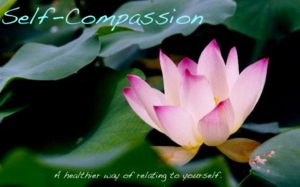 One of the hardest things for people to hear is, “If you are not compassionate with yourself, your ability to be compassionate with others is limited.” I get it! I didn’t like hearing it either. Why? Because it means the jig is up.
One of the hardest things for people to hear is, “If you are not compassionate with yourself, your ability to be compassionate with others is limited.” I get it! I didn’t like hearing it either. Why? Because it means the jig is up.
So What’s the Jig?
The jig is that we have all this compassion for the pain of others, when in reality, we don’t. At least not in the true sense of the word. (For more information on what compassion is, read my article, “Compassion Confusion”). Not having compassion for ourselves is a way of avoiding our own pain. It is also aggressive. If we cannot fully be present with (feel) our own pain, the pain of others will intimidate us. It will scare us. We will need to shut it down so that the fortress we have built to protect ourselves from our own pain is not threatened.
The Fortress:
We start building it at a young age. The people that cared for us most likely had emotions that they had no idea what to do with. So they suppressed them, and then suppressed them in us. And every time some experience came along that threatened to un-suppress them, we turned away. We hardened our hearts and strengthened the fortress.
So What’s the Problem?
The problem is that we want to be compassionate. It’s in our nature and at the core of who we are. It is also quite possibly the answer to all conflict that arises in the world. When we are less inwardly aggressive, we are less outwardly aggressive. We can’t do for others what we can’t do for ourselves. In addition, the problem is we are creating an incredible amount of unnecessary suffering for ourselves. As the Dalai Lama says, “We can never obtain peace in the outer world until we make peace with ourselves.”
A Lesson From the Horses
Today I walked out to the pasture to halter Hermano and bring him in for a vet visit, which is not my favorite thing to do. It was cold, I’d forgotten my jacket, and I had no gloves. I was lost in my mind and aggressive thoughts. “This sucks. I’m cold. Why did you forget your jacket and gloves? That was stupid. (Inward aggression). It was 65 yesterday. Why do they have to be out in the pasture today? Why can’t they just be in? I should bring Aubie’s halter too- Hermano won’t come in if Aubie doesn’t follow….” (Outward Aggression) Then I caught myself creating misery for myself with my thoughts. I noticed I was fully engaging my fortress- hardening to my experience, being self-aggressive as well as projecting aggression outward- wanting the horses and the weather to be other than how they were.
So I slowed down my pace, took some conscious breaths and checked in. I felt irritated and tense. That was enough awareness for me to shift my focus. I began to allow my experience gently. I felt the cold in my fingertips and cheeks. I relaxed and felt my feet on the ground. I looked around and noticed the clouds in the sky and the horses on the side of the hill. Then an amazing thing happened. Hermano saw me, and he started galloping towards me excitedly. Aubie and the others quickly followed and all the horses came running in to greet me. Hermano walked right up to me and gently placed his nose in the halter. By allowing myself to be present and compassionate with my actual experience, I opened myself up to having an experience other than a miserable one.
How Can I Practice Self-Compassion?
To practice self-compassion we need to put our awareness on the energy inside our physical bodies and allow ourselves to feel our experience. This is the beginning of the dismantling of the fortress. Our minds want to judge our experience and ourselves. Becoming curious about what happens if I just allow my truth is the first step. We often feel resistance at first. That’s ok- just start there and feel the resistance. Life will give us plenty of opportunities to practice every day. Someone cuts you off in traffic? Practice. Your child is being willfully defiant? Practice. Someone you care about is dying? Practice. Ask yourself, “How can I open to my experience, rather than shut it down?” This practice will enable us to cultivate compassion for ourselves and others.

